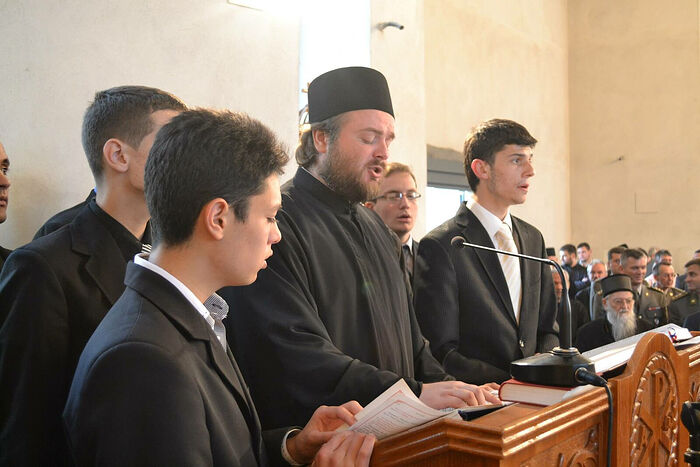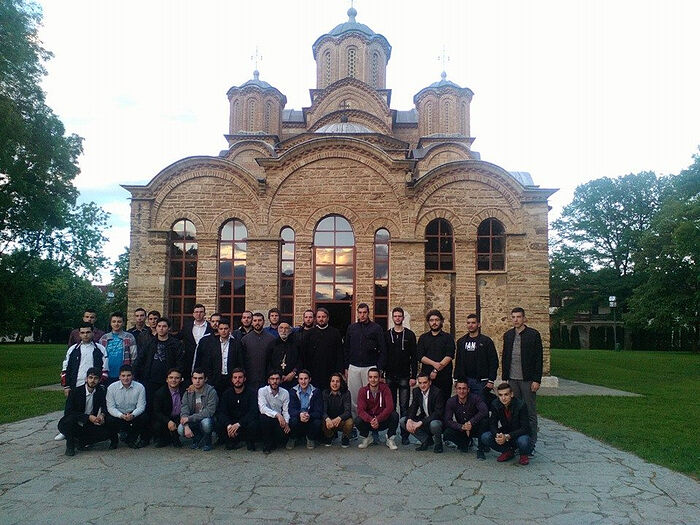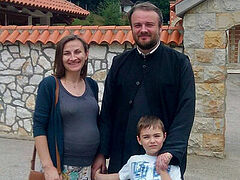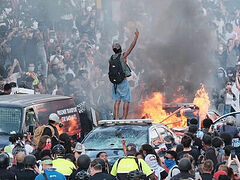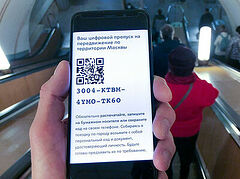Fr. Dejan Krstic was born and raised in Kosovo, but was forced to leave that long-suffering region after the “recognition of independence” of the territory and the sad events that followed. He decided to become a priest quite unexpectedly, but he is sincerely happy with his choice and grateful to God for this path.
We talked with Fr. Dejan of the Nis Diocese of the Serbian Orthodox Church, priest of the Church of the Resurrection of Christ at the dependency (metochion) of Hilandar Monastery in Nis and a part-time teacher of Church Slavonic at the Prizren Theological Seminary of Sts. Cyril and Methodius, about the difficult lot of the Prizren Seminary, the Kosovo issue, spiritual authorities, preaching on the internet, the link between the economy and the atmosphere in society and the spiritual state of a people, service as the most important principle of a priest’s life, and love as motivation for a pastor.
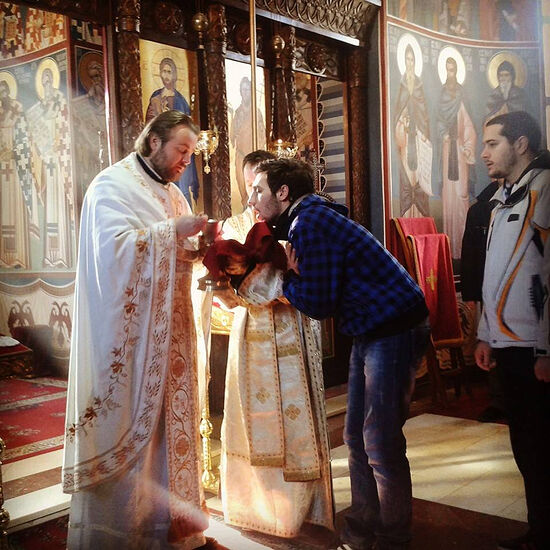 Young parishioners recieving Communion
Young parishioners recieving Communion
—Do you serve at the Hilandar Monastery dependency?
—Yes, I do. Our Church of the Resurrection of Christ is a young community that began with the opening of a seminary in the city of Nis. The dependency of the Hilandar Monastery has existed in Nis since ancient times. It was originally located opposite the city’s cathedral but was destroyed during the bombing of the city at the end of World War II. After the war the Communist Government confiscated the dependency’s land and built a multi-storied building on it. Later, thanks to the care and efforts of Abbot Nikanor (Savic) of Hilandar, the monastery managed to regain the land, albeit not on the original site but where the dependency is situated today.
In the winter of 1999, when we moved to the seminary in Nis, the walls of our future church had already been erected. And we immediately proceeded to arrange it so that we could celebrate services. At the same time, Bishop Irinej opened a parish where priest-teachers from our seminary serve to this day, and seminarians participate in the liturgical life together with local parishioners. The faithful are very attracted by the beautiful and harmonious singing of our seminary choir.
All the daily services are regularly held in our church throughout the year. On Mondays, after the evening service, we read the akathist hymn to the Most Holy Theotokos, after which we talk with our parishioners on spiritual subjects and answer their questions. After each Liturgy, we arrange an agape meal with the parishioners in the parish hall. We try our best to show concern for the faithful.
By the way, now next to the church we also have a parish library named after Elder Nikanor of Hilandar (whom I mentioned above), with about 5,000 books. The library is accessible to all parishioners.
—Fr. Dejan, you are participating in a wonderful project, called, “Living Words”. Can you tell us more about it?
—Living Words is a private initiative of a great enthusiast, Archpriest Jovan Cvetkovic from Krusevac. Fr. Jovan is a permanent member of the Missionary Department of the SOC Holy Synod. He invited me and I agreed, received my bishop’s blessing, and together with priests Milorad Mirovic and Predrag Popovic we took part in implementing this work, the purpose of which was to preach the Word of God to as many people (who spend ever more time on the Internet and in social media) as possible.
Thus, the words of Christ, Whatsoever ye have spoken in darkness shall be heard in the light; and that which ye have spoken in the ear in closets shall be proclaimed upon the housetops (Lk. 12:3), are being fulfilled. In our programs on the website we preach the Word of God, talk about the feasts and saints of the Church, the problems of our society through the lens of the Gospel, answer questions of believers, pray with people about their needs, and invite interesting guests for conversation. But our intention is not to be “online clergy”—God forbid! We don’t want to become “Orthodox gurus”. We just want people to understand that they will never be alone, the Church will never leave them without kind words, consolation and prayer.
Our project and contact with people online were of particular value when we were all under quarantine due to the pandemic.
In addition to the spiritual topics we are working on, in the Living Words project we also carried out several specific humanitarian actions to raise money to help a young man whose house had burned down. We also help raise funds for the treatment of children abroad.
Almost every day we receive letters and messages in which people thank us and tell us how important this project is for them and what a positive effect it has on their lives. It is a great joy for us and a motivation to continue working for the glory of God and for the good of our neighbors.
—Of course, the pandemic has shown us the role the faith plays in the lives of different peoples today. What conclusions have you drawn personally about the nation’s spiritual state, based on the examples of your contacts in recent years? Can we say that there is a spiritual crisis, a drifting away from the Church; or to the contrary a spiritual upsurge?
—I will say that the spiritual crisis is directly related to the economic crisis. Yes, it is so! In recent decades, especially up to the end of the twentieth century, Serbia has experienced many adversities, such as wars, sanctions, poverty, and internal political upheavals... In their struggle for survival people very often forget “the only thing that matters.” The years of Communist rule have left their mark, particularly on the older generations. But thank God, more and more young people are joining in the life of the Church not only formally and externally, but sincerely, in search of their spiritual identity, of the meaning and purpose of life, which they cannot find elsewhere. The enemy of our salvation tries to introduce temptations and create stumbling blocks between clergy and believers. But, according to public opinion polls, the Church, along with the Serbian Army, remains one of the most respected institutions of our nation. The voice of the Church is heard!
—You said that the spiritual crisis is related to the country’s economic issues, and I would ask you how the pace of life and the atmosphere in society impact the spiritual life of believers. Serbia is usually described as a peaceful country with a slow pace of life, and its people as very friendly.
—Indeed, God generously endowed our country with His gifts. We have a wonderful climate, beautiful nature, healing springs, mountains, fertile plains, vineyards, rivers and lakes... Our people, who have been brought up on the Gospel principles for many generations, are noted for their hospitality, sincerity and simplicity in conversation with neighbors. The influences coming to us from the West undoubtedly threaten to disrupt this spiritual harmony in our nation, but so far we have been resisting the spirit of consumerism and individualism, from which Europe is already suffering seriously. The more we adhere to Orthodoxy, the closer we get to ourselves, our roots and our true identity.
—Perhaps it is the abandonment of one’s roots and true identity that leads to what is called the “loss of faith.” Do you have a recipe for this sad phenomenon?
—Loss of faith is spiritual death. Faith makes one’s life meaningful. Thanks to faith, people have done great things in the past. How can we protect ourselves from losing faith? Let us constantly rely on God’s Providence. People usually lose faith in God during life’s temptations, hardships and losses. And God allows our faith to be tested because He believes in us. God believes in man! He will never allow more suffering than we can bear. If God allows us to be tempted, He will give us the strength to endure.
And I sincerely believe that the Orthodox Church is the ark of salvation, the treasury of the gifts of grace that are necessary for our union with God. If I didn’t think so, I wouldn’t be part of the Church. When I need to convince someone that the Orthodox Church is the only path to salvation, I simply say, “If it were not so, would I waste time living in something that cannot give me communion with God? Everyone wants the best for themselves, right?”
—An interesting point of view... If we talk about the Serbian Church, in your opinion, what are the most important events in its life in recent years?
—The most important events... Perhaps they are the 800th anniversary of the autocephaly of the Serbian Orthodox Church in 2019, the centenary of the restoration of the Patriarchate of Pec (that is, of Serbia) in 2020, and the celebration of the millennium of the Archdiocese of Ohrid in 2018. In this jubilee year, with the sincere help of our Russian brothers, the construction of the memorial Church of St. Sava in Belgrade was completed. Our Prizren Seminary is celebrating its 150th anniversary this year. Such significant anniversaries, along with the fact that a new Patriarch, His Holiness Porfirije, has been raised to the throne of St. Sava, inspire hope that our great and glorious past is a good and solid foundation for our prosperous future as a people of God.
—What is the main lesson you have learned over the years of your priestly ministry?
—As you said it: it’s my ministry. We priests are servants of Christ, who came not to be ministered unto, but to minister, and to give our lives a ransom for many (cf. Mt. 20:28). Holy Righteous John of Kronstadt, a remarkable priest of the Russian Church, wrote: “I am a priest. So? There is nothing to say: I don’t belong to myself, but to others.”
— Father, if pilgrims should find themselves in your area, what shrines should they definitely visit?
—The Serbian land is replete with great shrines. However, every pilgrim should visit the garden of the Most Holy Theotokos in the Serbian land—the Monastery of the Protection of the Mother of God in Dunis in the Diocese of Nis. Once the Most Pure Virgin appeared there to a pious girl. There is also a spring of healing water as evidence of the presence of the Most Holy Theotokos in this place. For Russians, there is also the monastery of St. Roman of Dunis there, where the heart of Colonel Nikolay Raevsky (the prototype for Count Vronsky from the novel Anna Karenina by Leo Tolstoy) is buried, as well as the Russian Church of the Holy Trinity, built on the site of Raevsky’s death. You simply cannot pass by Cele Kula (“the Skull Tower”) in Nis, the only monument to the Serbian struggle for freedom and independence from the Ottoman yoke.
—Thank you for this wonderful interview! In conclusion, I will ask you our traditional question: What words from the Holy Scriptures inspire and support you in difficult moments of life?
—What motivates me and gives me strength in difficult moments of my personal, pastoral and educational work are the words of the Savior addressed to the Apostle Peter: Lovest thou Me...? Feed My lambs (Jn. 21:15). I draw strength from these words. And over the years I also realized that the main motive of my ministry should be love. And love gives meaning to everything. Charity suffereth long, and is kind; charity envieth not; charity vaunteth not itself, is not puffed up, Doth not behave itself unseemly, seeketh not her own, is not easily provoked, thinketh no evil; Rejoiceth not in iniquity, but rejoiceth in the truth; beareth all things, believeth all things, hopeth all things, endureth all things. Charity never faileth (1 Cor. 13: 4–8).

